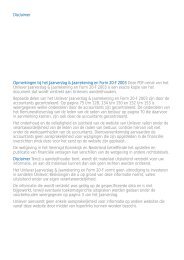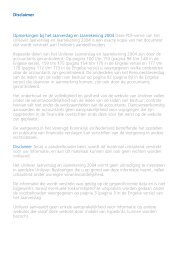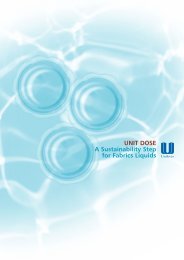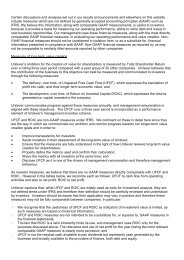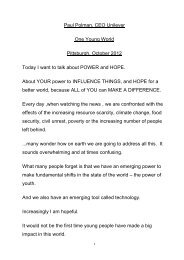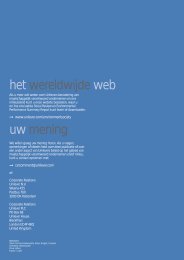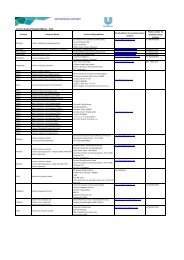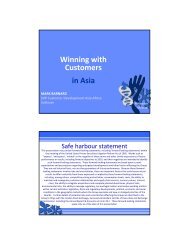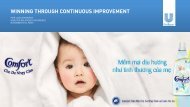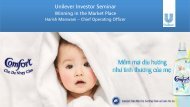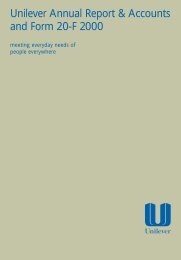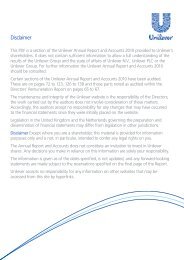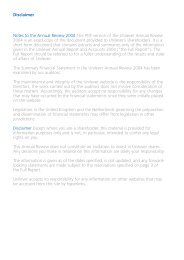Unilever Sustainable Living Plan Progress Report 2011
Unilever Sustainable Living Plan Progress Report 2011
Unilever Sustainable Living Plan Progress Report 2011
Create successful ePaper yourself
Turn your PDF publications into a flip-book with our unique Google optimized e-Paper software.
32 <strong>Unilever</strong> <strong>Sustainable</strong> <strong>Living</strong> <strong>Plan</strong> <strong>Progress</strong> <strong>Report</strong> <strong>2011</strong><br />
SUSTAInABLE AGRIcULTURE<br />
sUstainaBle tea sUstainaBle FrUit<br />
and vegetaBles<br />
sUstainaBle cocoa<br />
OUR TARGETS<br />
6.4 By 2015 we aim to have the tea in<br />
all lipton tea bags sourced from<br />
rainforest alliance certified <br />
estates. By 2020 100% of<br />
<strong>Unilever</strong>’s tea, including loose tea,<br />
will be sustainably sourced.<br />
l<br />
OUR PERFORMANCE<br />
57% of our lipton tea bag<br />
blends contained sustainable<br />
tea at end <strong>2011</strong>: 25% was fully<br />
rainforest alliance certified <br />
and 32% contained a proportion<br />
of rainforest alliance certified <br />
tea en route to full certification.<br />
overall, 28% of the tea purchased<br />
for all our brands was sourced<br />
from rainforest alliance<br />
certified farms.<br />
In 2007 we were the first major tea<br />
company to commit to sustainable<br />
sourcing of tea on a large scale. We are<br />
on track to achieve our 2015 milestone<br />
and 2020 target.<br />
our success is dependent on changing<br />
farming practices among our tea<br />
producers. In Kenya 250,000 farmers have<br />
now undertaken training in farmer field<br />
schools. By the end of <strong>2011</strong> we had also<br />
trained nearly 50,000 more farmers in<br />
Rwanda, Sri Lanka, Indonesia and Turkey.<br />
OUR TARGETS<br />
6.5 We will purchase 100% of our fruit<br />
from sustainable sources by 2015.<br />
6.6 We will purchase 50% of our top<br />
13 vegetables and herbs from<br />
sustainable sources by 2012 and<br />
100% by 2015. this accounts for<br />
over 80% of our global vegetable<br />
and herb volume.<br />
l<br />
l<br />
OUR PERFORMANCE<br />
We made steady progress in<br />
helping our fruit suppliers to move<br />
towards sustainable practices. We<br />
expect to make our first purchases<br />
of sustainable fruit in 2012.<br />
25% of vegetables and herbs<br />
purchased from sustainable<br />
sources by end <strong>2011</strong>.<br />
In <strong>2011</strong> we rolled out an updated<br />
version of Quickfire, our self-verification<br />
tool, which helps suppliers assess<br />
whether their practices meet the<br />
requirements of the <strong>Unilever</strong> <strong>Sustainable</strong><br />
Agriculture code.<br />
By the end of <strong>2011</strong>, over half our<br />
suppliers of fruit and vegetables had<br />
already committed to self-verification.<br />
OUR TARGETS<br />
6.7 We will source cocoa sustainably<br />
for our Magnum ice cream by<br />
2015. all other cocoa will be<br />
sourced sustainably by 2020.<br />
l<br />
OUR PERFORMANCE<br />
37% of cocoa for Magnum<br />
sustainably sourced through<br />
rainforest alliance certification by<br />
end <strong>2011</strong>. overall, 21% of all cocoa<br />
sourced sustainably.<br />
We buy Rainforest Alliance certified cocoa for Magnum and Fairtrade cocoa<br />
for Ben & Jerry’s ice cream.<br />
We have been expanding our Rainforest<br />
Alliance certification programme in<br />
West Africa. This will boost sustainable<br />
agricultural practices in the region. After<br />
just one year, over 10,000 farmers have<br />
achieved Rainforest Alliance certification.<br />
In 2012 we signed a long-term partnership<br />
agreement with Barry callebaut, a<br />
supplier of high-quality cocoa products.<br />
This will create a step change in our ability<br />
to source sustainable cocoa.<br />
sUstainaBle sUgar<br />
OUR TARGETS<br />
6.8 We will source all sugar<br />
sustainably by 2020.<br />
l<br />
OUR PERFORMANCE<br />
around 1% of cane sugar<br />
sustainably sourced by end <strong>2011</strong>.<br />
We purchase two types of sugar – cane<br />
sugar and beet sugar.<br />
cane sugar comes largely from tropical<br />
regions and accounts for the majority of<br />
our purchases. We have joined Bonsucro<br />
(a multi-stakeholder body dedicated to the<br />
sustainable cultivation of sugar cane),<br />
and have encouraged our suppliers to<br />
do the same.<br />
our beet sugar suppliers are mostly<br />
European. During <strong>2011</strong> we assessed their<br />
practices against the <strong>Unilever</strong> <strong>Sustainable</strong><br />
Agriculture code.



